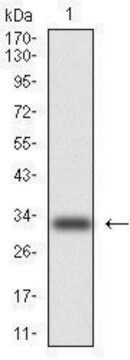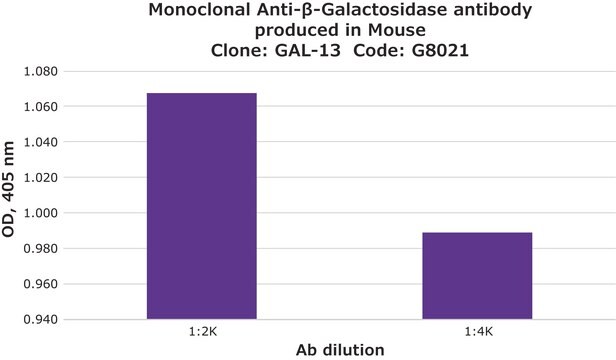V4630
Anti-Vimentin antibody produced in goat
whole antiserum
Sinónimos:
Anti-F5H288
About This Item
Productos recomendados
biological source
goat
Quality Level
conjugate
unconjugated
antibody form
whole antiserum
antibody product type
primary antibodies
clone
polyclonal
mol wt
antigen 58 kDa
contains
15 mM sodium azide
species reactivity
wide range, human
technique(s)
immunohistochemistry (formalin-fixed, paraffin-embedded sections): suitable
immunohistochemistry (frozen sections): suitable
indirect immunofluorescence: 1:20 using formalin-fixed, paraffin-embedded sections of human tissue
western blot: 1:50 using HS-68 human foreskin cell extract
UniProt accession no.
shipped in
dry ice
storage temp.
−20°C
target post-translational modification
unmodified
Gene Information
human ... VIM(7431)
General description
Specificity
Immunogen
Application
- immunohistochemistry
- western blotting
- immunocytochemistry
- flow cytometry
Chromatin immunoprecipitation (1 paper)
Immunocytochemistry (1 paper)
Immunofluorescence (1 paper)
Immunohistochemistry (1 paper)
Biochem/physiol Actions
Disclaimer
¿No encuentra el producto adecuado?
Pruebe nuestro Herramienta de selección de productos.
Optional
Storage Class
13 - Non Combustible Solids
wgk_germany
WGK 1
flash_point_f
Not applicable
flash_point_c
Not applicable
ppe
Eyeshields, Gloves, multi-purpose combination respirator cartridge (US)
Certificados de análisis (COA)
Busque Certificados de análisis (COA) introduciendo el número de lote del producto. Los números de lote se encuentran en la etiqueta del producto después de las palabras «Lot» o «Batch»
¿Ya tiene este producto?
Encuentre la documentación para los productos que ha comprado recientemente en la Biblioteca de documentos.
Los clientes también vieron
Nuestro equipo de científicos tiene experiencia en todas las áreas de investigación: Ciencias de la vida, Ciencia de los materiales, Síntesis química, Cromatografía, Analítica y muchas otras.
Póngase en contacto con el Servicio técnico













